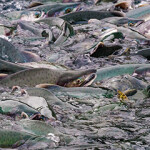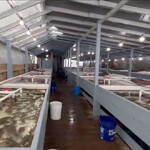Carving a niche, one salmon at a time
Wester Ross, a small independent firm farming salmon on the northwest coast of Scotland, doesn’t try to compete with bigger foreign-owned companies in producing salmon as cheaply as possible for a mass market. It has carved a niche for itself producing what it calls “hand-reared” salmon.
This means, quite literally, that everything connected with the rearing and processing of its salmon, even feeding, is done by hand. Gilpin Bradley, the company’s managing director, uses the phrase: “Real people doing real jobs.”
“Hand-reared Scottish salmon has the right kind of image,” he said. “We operate in harmony with the environment. We even produce fishmeal for our feed from the trimmings from pelagic fish caught locally. There is nothing more sustainable than that.”
Established in 1977, Wester Ross is the oldest, and the smallest — it produces 1,500 to 2,000 tons of salmon annually — of the three completely independent salmon farmers now left in Scotland; 95 percent of the Scottish salmon farming industry, now the world’s second largest after Chile’s demise, is in Norwegian hands.
The traditional, labor intensive methods Wester Ross uses for rearing and processing salmon means that it produces “only healthy and happy fish,” which, it claims, have a natural, better taste when compared with the mass produced fish from other companies.
“We are the only salmon farm in Scotland to feed salmon entirely by hand,” said Bradley. “We are also the only salmon farm in Scotland to use a passive grading method to ensure that our salmon do not leave the water between smolt intake and final harvest, a period which can take up to two years.”
Wester Ross specializes in selling salmon to smokers — “our diet and feeding practice has been developed for this” — and half of its sales are of fillets for this market. The company also sells whole salmon and fillets to caterers in the United Kingdom and continental Europe and to export markets including Japan, Hong Kong and the United States.
It has started to carry out joint branding operations with customers such as Loch Fyne, a Scottish smoker and specialty seafood supplier. Loch Fyne has just launched a Citrus and Black Pepper Infused Scottish Smoked Salmon using fish supplied by Wester Ross, which has its logo and a short statement on the package. Wester Ross was promoting the product, which is available in 200-gram packs and hand-sliced sides, at last month’s European Seafood Exposition in Belgium.
Co-branding such as this is very unusual, and although the Loch Fyne name dominates the package, the fact that the Wester Ross name is there at all shows that the company is recognized for the way in which it produces its salmon. In fact, Loch Fyne claims to seek out salmon “that has been farmed with care and caution by independent companies, dedicated to looking after the local ecology.” Wester Ross is one of its two principle suppliers.
“Loch Fyne was the original smokehouse to promote the RSPCA Freedom Food label with which we are accredited,” said Bradley. “The label has the highest consumer recognition rating in the UK.”
Wester Ross was one of the first salmon farmers in Scotland to meet the welfare standards laid down by the RSPCA (Royal Society for the Prevention of Cruelty to Animals) Freedom Food standards. The RSPCA Freedom Food scheme covers all aspects of salmon rearing — management, husbandry, equipment, environmental quality, feeding, health, transport and slaughter.
“Animal welfare is consistently repeated by [British] consumers as being of critical concern in farming,” said Bradley, “so this standard will allow further differentiation from other commodity salmon farmers.”
Wester Ross has also tried to ensure that all its operations minimize environmental impact, and that it can trace its products back to eggs and previous generations of fish. The company is fully integrated from fry to fillets, said Bradley.
While this back-to-nature approach may not work for large companies, it has obviously hit a chord with the more discerning consumer who cares about the way in which his or her food is produced.
But more and more customers are starting to think in this way. So what has started out as a niche market will, in time, become more mainstream.
All Commentaries >





Share